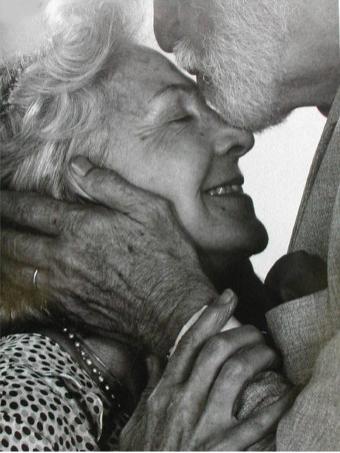April Grace Has A Change Of Heart
 A short story by
A short story by
Kathaleen McCrite
My grandma has a boyfriend, and he gets on my nerves big time. He's loud and corny, and it seems like he's always at her house. She cooks for him, makes his special favorites, laughs at his dumb jokes – and believe me, he has a lot of dumb jokes.
Worst of all, she gets all dolled up for him, wearing her church clothes for every day. Grandma and I hardly ever have any alone-time since Mr. Rance came into our lives.
“Doesn't Mr. Rance about drive you buggy and bust your eardrums with his big mouth?” I asked her after the old man excused himself from our table at the Koffee Kup to make a phone call.
All dreamy-eyed, she watched him walk away.
“I don't think he knows how loud he is,” she said.
I rolled my eyes. “All that talk, talk, talk. He never stops! Doesn't he drive you buggy?”
I bit into my bacon cheeseburger, which is my favorite thing to eat at the Koffee Kup, and happily munched on it while Grandma tore open a little blue packet of sweetener and stirred it into her coffee. She stirred for a long time then finally looked at me with a little frown…
“He bought you that huge hamburger. And those cheesy fries. And that double-chocolate milkshake. And I don't remember you even thanking him.”
I swallowed a bite whole. “But he asked me what I wanted! If he didn't want to buy it for me, he shouldn't have asked.”
She closed her eyes for a moment then opened them. “That is not the point. April Grace, you listen to me.” There was sharp edge in her voice that I didn't like. “I love you dearly, so I'm going tell you something that'll do you good: you need to stop finding fault with everyone.”
“Oh, but Grandma! There are so many irritating people in the world. Mr. Rance. Ian and Isabel St. James. Mrs Heathcliff at the library. Why, she--”
“Let me tell you something, youngster. There has never been but one perfect person in the world, and they killed Him. If you keep looking at the things you don't like about folks, you'll never have friends. Or any fun, either.”
“Well, I might like more people if they weren't so annoying,” I declared.
She sighed. Real loud. “Folks don't act the way they do to annoy you. They act the way they do because they're people.”
“But--”
“No buts about it. Jeffrey Rance lost his wife last Christmas and he's lonesome with no one to talk to. He's hard of hearing, so he doesn't know how loud he is. He's a good man.”
“But he's so pushy.”
“Not pushy. Enterprising.”
I rolled my eyes again. I called it pushy, and would ever after.
“Well, you have to admit Ian and Isabel St. James are way more than just annoying,” I said.
Ian and Isabel moved into our neighborhood not long ago, but they didn't have a place to live because the house they bought was a dump and had to be fixed. My daddy and mama just said right out, “Why don't you come and stay with us until your house is livable?” Just like that. They never said a word to me. I would have told them: “Run! Run for your lives!” Because it was plain as day to me that those St. James people aren't the kind of folks you want to spend a lot of time with.
“Well, yes, I admit they are a little tedious,” Grandma said.
“Yeah! And guess what else! Isabel doesn't do a blessed thing all day long but sit around and expect Mama to wait on her hand and foot.” I warmed to the subject so much I scrooched around in my chair. “Mama asked Isabel to snap some green beans for her today. Can you picture ol' Isabel breaking beans with her long red fingernails in the way? And Ian keeps breaking daddy's tools. Daddy said--”
Grandma stopped me right in the middle of my tale. “Tell me something, child. Who do you admire more than anyone?”
I thought about it. “You mean besides Jesus?”
“Yes.”
“Mama and Daddy. And you.”
She smiled the tiniest little bit. “Leave me out of it. You ever notice how your daddy and mama don't try to find fault with people? You notice how they hardly ever have anything bad to say about anyone?”
“I know! And there are those St. Jameses, living right there with us, twenty-four-seven! Mama and Daddy treat them just like special relatives, or something.”
Grandma nodded, then sipped her coffee.
“Your parents do the Christian thing by folks.”
“I know that. But--”
“If anyone in the world has a reason to feel distrustful and pessimistic about folks, it's your mama.”
This was news to me. My ears perked up. “What do you mean?”
She moved her coffee cup around on the table in little circles and the waitress trotted over to fill it up even though it was still mostly full.
“Grandma, I'm eleven. I'm old enough to know some things.” She just looked at me, so I added, “And keep my mouth shut about them.”
“I've never known you to keep your mouth shut about anything.”
“Grandma.”
She pondered and thought and pursed her mouth like she was really searching for guidance. I hoped she didn't take too long because that old man, her boyfriend, was bound to come back to the table pretty soon. And when he did, none of us would have a chance to get a word in edgewise because he'd either talk about football, horses, or his newest scheme to make money. He had a lot of ideas, from painting woodland scenes on rusty saw blades to fixing up old washing machines.
“Here's the thing,” she said, finally. “Your mama had it pretty rough growing up.”
Mama hardly ever said anything about her childhood, even when I asked her things, so now I was really interested.
“Your other grandma was not a nice woman, and that's putting it mildly.”
“What'd she do?”
“For one thing, she didn't want your mama and gave her over to an aunt to raise. The thing was, the aunt didn't want Lily, either.”
I was completely outraged.
“How could anyone not want Mama?” I yelled. Every single person in that lunch time crowd looked at me.
“Hush, child! Sit down.” Grandma pushed me back into my chair.
“But, but--” I snapped my mouth shut, which was hard to do when the words wanted to spew out like a geyser.
“Your mother's great-aunt Maxie have her a place to live, but that was about all. First time I saw Lily was at church during Vacation Bible School. She was the scrawniest, dirtiest, pitifulest little thing you ever saw. Back in those days the state didn't step in and take care of kids the way they do now. Your daddy said the kids at school picked on Lily something fierce, but Mike always did his best to stand up for her.”
“Daddy has always been a hero,” I declared in admiration.
She nodded. “Yes. He wasn't always there to watch out for her, but he did his best. And I'll tell you something about your mama: that little redheaded girl had the most beautiful shining smile you ever saw.”
“She still does,” I said happily because folks said I looked a lot like her.
“Once the church folks saw Lily, why, we did everything we could for her, gave her clothes and brought her snacks and things, but Maxie didn't like that. Made her look bad, I guess. After a while, she refused to let Lily come to church anymore.”
“Mean old woman!”
“Anyway, when Lily was about ten years old, her mama swept into town, declared she'd had a change of heart, packed up the girl and took off with her but we don't know where. A year or so later, she brought Lily back, dumped off on the old aunt again, then she left for good. She's never come back.”
Grandma took a paper napkin from the dispenser and patted a tear off my cheek.
“There, child. Maybe I shouldn't have told you anything.”
“No,” I said, sniffling. “I'm glad you did. But why won't Mama ever talk about this? None of it was her fault; she didn't do anything wrong.”
“That's the thing, honey. Lily Reilly lives by First Corinthians 13. You know that scripture I'm talking about?”
“I think so.”
“It says love is patient and kind and doesn't get easily angered or keep a record of wrong-doing. Your mama – and your daddy, too – believe in that scripture and live their lives by it.”
“I know,” I sighed. I didn't see how anyone could live by that scripture, especially me so many people aggravated me so often.
“When the old aunt had a stroke shortly after your mama and daddy got married, you know what they did?”
I shook my head.
“They took her into their tiny apartment, and while your daddy got his agricultural degree in college, your mama took care of Maxie. She waited on her, nursed her, bathed and fed her until the woman died a year and a half later. It wasn't easy on Mike or Lily, but they believed it was the right thing to do and they did it.”
There was a silence hanging between Grandma and me thick enough to slice with a knife. It finally soaked into my brain that if my mama could tolerate and forgive someone who treated her so mean, I could do the same to folks who got on my nerves. It was all kind of hard for me to understand because my getting irritated happened so often without any effort at all. I decided, though, to give it a shot.
When that old man finally returned to our table, I remembered him giving me some Kraft caramels last week because he knew I liked them. And he seemed to enjoy hearing me recite poetry I'd learned in school. If Mama, and Daddy could be nice to those who treated them so rotten, the least I could do was give it a try.
I looked up at him and gave him a smile I hoped looked like my mama's.
“Thank you for buying me my favorite lunch,” I told him.
I said it loud, because sometimes his hearing aids don't work very well. I wanted to be sure he heard me.
 Kathaleen McCrite has three novels published under the name Kathaleen Burr (Home is the Heart, 1992; Wintersong, 1991; Rainbow Dreams, 1992; and Ozarks Farmer, Country Preacher: the Life of Paul Wesley Buchanan, High Hill Press, 2008.) Her short stories have appeared in The Storyteller, Woman's World and Kansas City Voices, and she has had several articles published in the Ozarks Mountaineer, Ozarks Reader and Ozarks Magazine.
Kathaleen McCrite has three novels published under the name Kathaleen Burr (Home is the Heart, 1992; Wintersong, 1991; Rainbow Dreams, 1992; and Ozarks Farmer, Country Preacher: the Life of Paul Wesley Buchanan, High Hill Press, 2008.) Her short stories have appeared in The Storyteller, Woman's World and Kansas City Voices, and she has had several articles published in the Ozarks Mountaineer, Ozarks Reader and Ozarks Magazine.
McCrite has also written Redemption, Whited Sepulchres, Eastgate Church Keeps on Singing, and Rough Creek Road, the latter two of which are series. These last four titles are all represented by Sullivan Maxx Literary Agency
McCrite is a former psychiatric caseworker with a degree in psychology from Drury University. In 1999, she was listed in Who's Who in American Colleges and Universities. Before working in the mental health field, she worked on the staff of two public libraries.
Related links:
Kathaleen McCrite’s website